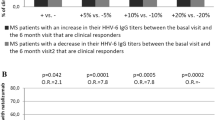Abstract
The purpose of this study is to monitor the development of anti-natalizumab antibodies to evaluate their first appearance in multiple sclerosis patients, since their presence has been associated with a reduction in the efficacy of the treatment and an increase of adverse events. A total of 134 multiple sclerosis patients were included in the trial. Anti-natalizumab antibodies were monthly detected by ELISA up to the first year of treatment and subsequently, a determination was made at 18 months. 15.7 % of the patients were positive, being 7.5 % transiently positive and 8.2 % persistently positive. The first appearance of anti-natalizumab antibodies occurred after the first month of treatment onset in 72 % of positive patients; 18 % did so after the second month, and 9.7 % after the third month. Antibodies were never detected for the first time after the fourth infusion. The development of anti-natalizumab antibodies occurs very early after treatment onset. This observation should be considered when standardizing the follow up of patients treated with this drug in order to minimize the risks and optimize the treatment.
Similar content being viewed by others
References
Stuve O, Bennett JL (2007) Pharmacological properties, toxicology and scientific rationale for the use of natalizumab (Tysabri) in inflammatory diseases. CNS Drug Rev 13:79–95. doi:10.1111/j.1527-3458.2007.00003
Polman CH, O’Connor PW, Havrdova E, Hutchinson M, Kappos L, Miller DH et al (2006) A randomized, placebo-controlled trial of natalizumab for relapsing multiple sclerosis. N Engl J Med 354:899–910. doi:10.1056/NEJMoa044397
Rudick RA, Stuart WH, Calabresi PA, Confavreux C, Galetta SL, Radue EW et al (2006) Natalizumab plus interferon beta-1a for relapsing multiple sclerosis. N Engl J Med 354:911–923. doi:10.1056/NEJMoa044396
Calabresi PA, Giovannoni G, Confavreux C, Galetta SL, Havrdova E, Hutchinson M et al (2007) The incidence and significance of anti-natalizumab antibodies: results from AFFIRM and SENTINEL. Neurology 69:1391–1403. doi:10.1212/01.wnl.0000277457.17420.b5
Oliver B, Fernández O, Orpez T, Alvarenga MP, Pinto-Medel MJ, Guerrero M et al (2011) Kinetics and incidence of anti-natalizumab antibodies in multiple sclerosis patients on treatment for 18 months. Mult Scler 17(3):368–371. doi:10.1177/1352458510385508
Sørensen PS, Jensen PE, Haghikia A, Lundkvist M, Vedeler C, Sellebjerg F et al (2011) Occurrence of antibodies against natalizumab in relapsing multiple sclerosis patients treated with natalizumab. Mult Scler 17(9):1074–1078. doi:10.1177/1352458511404271
Fernández O, Alvarenga MP, Guerrero M, León A, Alonso A, López-Madrona JC et al (2011) The efficacy of natalizumab in patients with multiple sclerosis according to level of disability: results of an observational study. Mult Scler 17(2):192–197. doi:10.1177/1352458510385507
Lundkvist M, Hillert J, Fogdell-Hahn A (2010) No increased risk for antibody formation against natalizumab in multiple sclerosis patients positive for neutralizing antibodies to interferon-beta. Mult Scler 16(Suppl. 10):S296. doi:10.1177/1352458510385507
Sorensen PS, Koch-Henriksen N, Jensen X (2011) Neutralizing antibodies against interferon-beta do not predispose antibodies against natalizumab. Neurology 76:759–760. doi:10.1212/WNL.0b013e31820d62a4
Conflicts of interest
B. Oliver reports no disclosures. T. Órpez reports no disclosures. P. Urbaneja reports no disclosures. R. Maldonado-Sanchez reports no disclosures. L. Leyva reports no disclosures. Dr. Fernández has received honoraria as a consultant in advisory boards, and as chairman or lecturer in symposia, and has also taken part in clinical trials and other research projects promoted by Biogen- Idec, Bayer-Schering, Merck-Serono, Teva, Novartis, Almirall, Allergan and Genzyme.
Ethical standard
The ethics committee approved the follow up of Natalizumab treated patients, the clinical and laboratory exams and the related study on 20/05/2010 (CTS507).
Author information
Authors and Affiliations
Corresponding author
Additional information
L. Levya and O. Fernández contributed equally to the manuscript.
Rights and permissions
About this article
Cite this article
Oliver-Martos, B., Órpez-Zafra, T., Urbaneja, P. et al. Early development of anti-natalizumab antibodies in MS patients. J Neurol 260, 2343–2347 (2013). https://doi.org/10.1007/s00415-013-6991-2
Received:
Revised:
Accepted:
Published:
Issue Date:
DOI: https://doi.org/10.1007/s00415-013-6991-2




